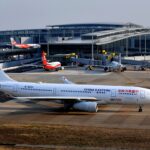International orders look up but businesses under pressure from rising inflation
China’s manufacturing activities in March remain in the expansion territory for the 11th month, but grew by the slowest pace in almost a year, according to a private survey.
The Caixin/Markit Manufacturing Purchasing Managers’ Index (PMI) dropped to 50.6 last month, the lowest level since May in 2020. The figure was down from February’s 50.9, missing analyst expectations of 51.3.
A reading above the 50 mark suggests growth, while a reading below indicates contraction on a monthly basis.
The Caixin survey, which concentrates on smaller private firms, is in contrast with the official PMI released by the National Bureau of Statistics (NBS) on the day prior, which registered 51.9 percent in March, up 1.3 percentage from February and shows the strongest growth in manufacturing so far this year.
The NBS data showed an overall positive recovery regardless of industries or scale of the companies. Industries like professional equipment and nonmetallic mineral products recorded a New Order Index above 55 percent, and the New Order Index rose by 2.1 percentage points from February to 53.6 percent in March, showing the country’s fastening steps in manufacturing production.
The discrepancy could be because the short term pressure from rising cost is more acutely felt by smaller businesses, who make up most of the interviewees in the Caixin survey, according to Bai Ming, deputy director of the international market research institute at the Chinese Academy of International Trade and Economic Cooperation.
“With the recovery from global economy, and the growing capacity of China’s factories, exports will show a robust growth in the long term,” Bai said.
The inflationary pressure has already been felt in March by China’s exporters and manufacturers. He Chong, an electric bike vendor on AliExpress, told the Global Times that the costs of materials, including metal accessories and tires, have risen by around 10 percent in March compared to the previous month.
However, He does not expect inflation on material cost to impact his business, as it will mostly be offset by the soaring international orders.
“In March the orders we received from oversea rose by around 200 percent compared to February,” He said. Most of his international shipments are sent to Europe from Foshan, South China’s Guangdong Province, where his company is based.
Caixin’s PMI suggests that the pace of expansion in China’s manufacturing sector has been slowing for four months. In March, employment index was in contraction for a fourth month, while index on prices soared as raw materials such as metal and crude oil continued to rise.
Wang Zhe, a senior economist at Caixin Insight Group, said in a statement accompanying the data release that while the figure shows the manufacturing sector is confident in economic recovery and pandemic control, more attention should be paid to inflation in the future, as the index on prices has been rising for several months.
He also noted that the room for adjusting policies in the future is limited due to inflationary pressure, which will not assist the economic recovery after the pandemic.
China’s non-manufacturing PMI, which gauges the sentiment in the service and construction sectors, climbed to 56.3 in March from 51.4 in February, the highest in four months, according to data released by the NBS. The result was above expectations of 52.
Photo:VCG


